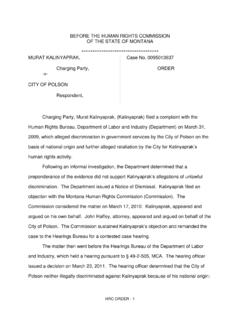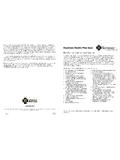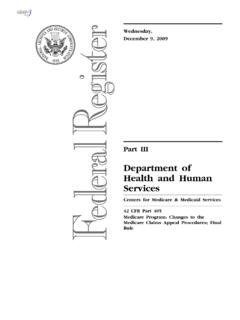Transcription of Assessment and Support of Post 18 UASC’s listed as …
1 1 Assessment and Support of Post 18 UASC s listed as appeal rights exhausted As of June 2012 1. Introduction 1. This paper has been produced by a Task and Finish Group established by the Local Government Association Asylum Refugee and Migration Task Group. The Task and Finish Group was asked to clarify the current position in asylum legislation in respect of the Support that unaccompanied asylum seeking children (UASC) may be entitled to receive after they reach 18 years of age (see sections 2 and 4); to explore the implications of the case of R (on the Application of) v London Borough of Barking and Dagenham (2010) (see section 3 below); and the role of human rights assessments (see section 5 below). 2. The Task and Finish Group included representatives of the Local Government Association, the ADCS Asylum Task Force, COSLA, WLGA and the No Recourse to Public Funds Network.
2 The Department for Education and the UK Border Agency participated in the Group and contributed to the final paper. 3. The paper does not attempt to provide an exhaustive statement of the relevant law, nor is it a substitute for detailed legal advice, either generally or in relation to complex issues that may arise through the consideration of individual cases. This document is intended only as background information with regards to the circumstances where local authorities may be required to provide a care leaver service to UASC who have reached 18 years of age and are appeal rights exhausted . What Assessment and Support is ultimately provided will be decided locally. 2 2. Background The current legal and policy framework in leaving care 4. Local authorities have clearly defined duties and responsibilities for their care leavers.
3 The Care Leavers (England) Regulations 2010 and guidance Planning Transition for Adulthood for Care Leavers requires local authorities to provide certain young people who turn 18 with appropriate leaving care Support . 5. This includes a regularly reviewed pathway plan and the allocation of a personal adviser who will provide advice and Support on a range of matters including accommodation up until the young person reaches the age of 21, or beyond if the young person is still in education. 6. The possibility of return for some asylum seeking young people should be discussed as part of the pathway planning process, where there is a possibility of them becoming Appeals rights exhausted . 7. The revised regulations and guidance on Support for care leavers are intended to bolster the quality of Support , and bring consistency so that all young people receive the same opportunities to succeed as their peers.
4 Key entitlements for care leavers include: the 2000 Higher Education Bursary for all eligible care leavers; a new 16-19 Bursary scheme which will begin from the start of the 2011/12 academic year. Looked after young people and care leavers are guaranteed a 1,200 bursary if they continue in full-time education; the provision of a personal adviser. Since April 2011 care leavers up to age 25 who return to education or training have been able to also benefit from the Support of a personal adviser while they are on their agreed course; and provision of vacation accommodation if the young person is in higher education 3 The current legal and policy framework in immigration law 8. The immigration status of UASC is not relevant to the consideration of their Support entitlement for as long as they are under 18 years of age. All fall to be supported by Local Authorities under the provisions of the Children Act 1989 - in the same way as any other child in need.
5 9. The position after the young people reach 18 years of age is more complicated. However, the great majority will have been supported under section 20 of the Children Act 1989 and will therefore be former relevant children . This means that they will (subject to immigration considerations described below) be entitled to leaving care Support services, including accommodation where needed, from their Local Authority. (The small minority who are not former relevant children will be entitled to Support from the UK Border Agency if their asylum claim is still outstanding or be able to access mainstream benefits if they have been granted leave to remain in the United Kingdom). 10. The financial cost of providing accommodation and subsistence for former relevant children is usually provided through mainstream benefits (for as long as the person has leave to remain in the United Kingdom) although the cost of these and other services may sometimes be supplemented by Local Authority expenditure and grant funding from the UK Border Agency.
6 11. Access to mainstream benefits ends if the person no longer has leave to remain in the United Kingdom. In practice, this is likely to only happen in cases where the young people have been refused asylum and the period of limited Discretionary Leave to Remain that was awarded to them before they turned 18 has now expired (sometimes after an application to extend the period of leave has been rejected). From this point the person is likely to be classed as Appeals rights exhausted (ARE) by the UK Border Agency. In addition to the person losing access to mainstream benefits, the Local Authority will also only be able to access UK Border Agency funding for a period of 3 months after the ARE date, subject to the requirements of the grant conditions. For these reasons, Local Authorities may find that they need to review the cases of former UASC care leavers if they become ARE after they reach 18.
7 4 3. Schedule 3 of the Nationality, Immigration and Asylum Act 2002 12. Some Local Authorities have reviewed ARE cases with reference to Schedule 3 of the Nationality, Immigration and Asylum Act 2002. The starting point of their consideration is that leaving care Support , or more particularly Support under sections 23C, 24A or 24B of the Children Act 1989, is one of the classes of Support that may be unavailable to certain classes of people from abroad as a result of Schedule 3. Whether or not a person is affected by the restrictions in Schedule 3 depends on their immigration status. 13. Schedule 3 sets out the four classes of people who are deemed ineligible for a range of Support entitlements (subject to the exceptions described below). The ineligible classes are: (i) Person granted refugee status by another EEA state (ii) An EEA national and any dependants (iii) A failed asylum seeker who has failed to comply with removal directions (iv) A person unlawfully present in the UK (including visa overstayers, failed asylum seekers who applied for asylum in-country, illegal entrants, people in breach of their visa conditions).
8 14. The particular class that most UASC are likely to fall into (if at all) after they turn 18 is the fourth class of ineligible person listed above: person unlawfully present in the United Kingdom. In practice, any of the young people who originally lodged their asylum claims in-country (rather than at the port of entry to the United Kingdom) will be deemed unlawfully present in the United Kingdom if their asylum claim is refused and any appeals finally rejected; or in the case of those initially granted a period of Discretionary Leave to Remain (DL), once any application to extend DL is finally refused and any appeal finally determined as dismissed. 15. Most of the young people who claimed asylum at the port of arrival will also fall into the unlawfully present in the UK category after they turn 18 if their asylum claims fail and any applications for further DL have been rejected and their appeals finally dismissed.
9 5A much smaller number who claimed asylum at the port of entry and did not receive a grant of DL will not fall into the fourth category, but will fall into the third category if their asylum claim is rejected and they fail to comply with removal directions. 16. However, simply because a person falls into one of the four classes does not automatically mean that their leaving care Support , including any provision of accommodation and subsistence, should be stopped. 17. Under current asylum legislation, the Local Authority will still be under a duty to provide Support if this is necessary to prevent a breach of the individual s human rights (or rights under EU Community Treaties in the rare case where the person is a citizen of a European Economic Area country). 4. Impact of case of R (on the Application of) v London Borough of Barking and Dagenham (2010) 18.
10 The main finding of the court was to reject the Local Authority s argument that Section 23C(4)(c) of the Children Act 1989 does not create a duty to a Local Authority to accommodate a former relevant child; and their alternative argument that a Local Authority can look to the UK Border Agency to provide Support ( Section 4 Support ) when considering whether a former relevant child s welfare needs include a need for accommodation. 19. The Court decided that, when reading section 17 (6) of the Children Act, to not treat s23C similarly would lead to unacceptable consistency. It therefore found that a Local Authority does have a general duty to provide a former relevant child with accommodation under section 23C(4)(c) to the extent that his or her welfare requires it . 20. The second point from this ruling was that a Local Authority is not entitled, when considering whether the young person should be provided with accommodation, to take account of the possibility of their receiving Support under Section 4.














